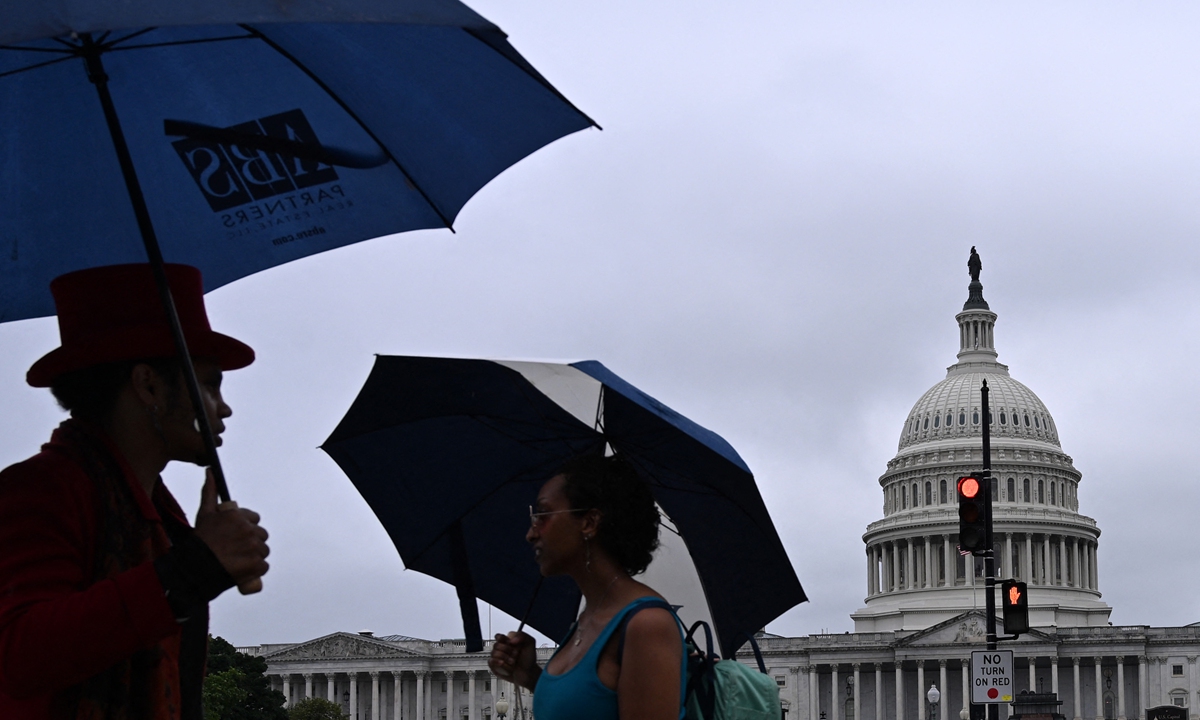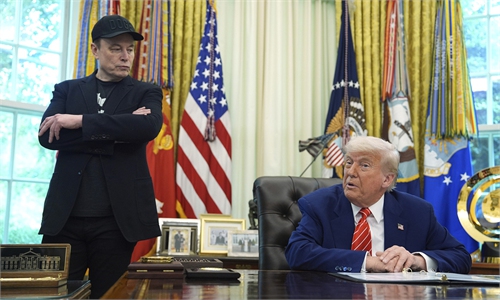Trump’s ‘big, beautiful bill’ advances in Senate amid domestic controversy, analysts warn of retaliatory tax provisions

Women carry umbrellas as they walk by the US Capitol building in Washington, DC, the US on June 27, 2025. Photo: VCG
Senate Republicans on Saturday night (US Eastern Time) took a significant step toward passing US President Donald Trump's "big, beautiful bill," voting 51-49 to begin debate on the sweeping legislation, according to reports from US media outlets including CNBC, Politico and Fox News.According to CNBC, the package cannot officially pass the Senate until a final vote is held. Saturday's vote, however, paved the way for that vote, expected to occur on Sunday or Monday.
Meanwhile, the bill has stirred significant domestic debate. US billionaire Elon Musk posted on X Saturday, "The latest Senate draft bill will destroy millions of jobs in America and cause immense strategic harm to our country!" Calling the legislation "utterly insane and destructive," Musk argued it provides subsidies to outdated industries while harming future-focused sectors.
US Representative Mike Lawler of New York also voiced opposition to the bill, warning on social media that any Senate measure retaining the $10,000 state and local tax cap would be "DEAD ON ARRIVAL" in the House, BBC reported on Saturday.
While two Republican senators — Rand Paul and Thom Tillis — voted against advancing the bill, joining Democrats in opposition, several GOP members changed course after intense negotiations, enabling the bill to proceed, Politico noted.
The White House reiterated Trump's commitment to the bill's passage. "President Trump is committed to keeping his promises, and failure to pass this bill would be the ultimate betrayal," the White House said in a statement on Saturday, according to CNBC.
Despite the US president's push for the legislation to be signed by July 4, CNN reported that the measure must return to the House even if it passes the Senate.
Although the bill largely focuses on US domestic affairs, several provisions have raised alarms abroad. As Nikkei Asia reported, The One Big Beautiful Bill Act would add a new Section 899 to the Internal Revenue Code, imposing additional taxes on companies and individuals in countries with taxes that the US deems unfair. The section includes a levy increase on stock dividends and interest on corporate bonds, which the Senate version of the bill would raise by 5 percentage points per year, up to a 15-point increase.
Japan could be targeted as it is set to introduce the undertaxed-profits rule (UTPR) in fiscal 2026 in line with international tax reform efforts. Both the House and Senate versions of the bill list the UTPR as an extraterritorial tax that would be subject to retaliation by the US, Nikkei Asia reported.
Several analysts cited by Nikkei Asia voiced concerns over the bill's international implications. Yoshimasa Maruyama, chief market economist at SMBC Nikko Securities, warned that retaliatory taxation could reduce returns, discouraging foreign investment in the US and impacting stock markets. Rie Nishihara, chief Japan equity strategist, noted that " companies that handle a large share of their production in the US would be especially hard hit."
"It wouldn't be surprising to see [investors] shift away from the US over the medium to long term to get away from policy uncertainty," said Suzuki from the NLI Research, according to Nikkei Asia.
A Chinese expert also voiced concern about the provision. "Imposing additional taxes on companies and individuals in countries with taxes that the US deems unfair would constitute a new form of taxation," Zhou Mi, a senior researcher at the Chinese Academy of International Trade and Economic Cooperation, told the Global Times on Sunday. He warned that such a move, if adopted by the US administration as a standard tax tool, could exacerbate tax distortions within the country.
"Given the US' current abuse of tariffs, if this new tax mechanism is implemented alongside the Big Beautiful Bill, it could significantly undermine global tax equity and development models," Zhou added.


